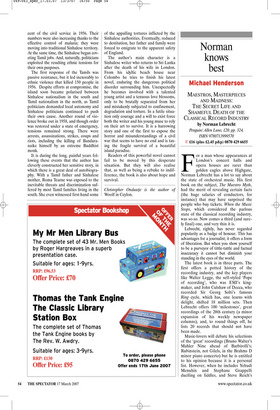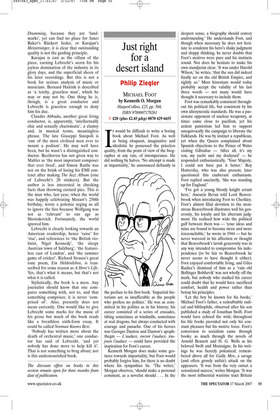Norman knows best
Michael Henderson
MAESTROS, MASTERPIECES AND MADNESS: THE SECRET LIFE AND SHAMEFUL DEATH OF THE CLASSICAL RECORD INDUSTRY by Norman Lebrecht Penguin/ Allen Lane, £20, pp. 324, ISBN 9780713999570 ✆ £16 (plus £2.45 p&p) 0870 429 6655 For a man whose appearances at London’s concert halls and opera houses are rarer than golden eagles above Highgate, Norman Lebrecht has a lot to say about the state of orchestral music. His first book on the subject, The Maestro Myth, had the merit of revealing certain facts (the huge salaries of conductors, for instance) that may have surprised the people who buy tickets. When the Music Stops, which considered the parlous state of the classical recording industry, was so-so. Now comes a third (and surely final) one, and very thin it is.
Lebrecht, rightly, has never regarded popularity as a badge of honour. This has advantages for a journalist; it offers a form of liberation. But when you show yourself to be a purveyor of tittle-tattle and factual inaccuracy it cannot but diminish your standing in the eyes of the world.
The latest book is in three parts. The first offers a potted history of the recording industry, and the key players like Walter Legge, the self-styled ‘Pope of recording’, who was EMI’s kingmaker, and John Culshaw of Decca, who recorded Sir Georg Solti’s famous Ring cycle, which has, one learns with delight, shifted 18 million sets. Then Lebrecht offers 100 ‘milestones’, great recordings of the 20th century (a minor expansion of his weekly newspaper columns), and, to round things off, he lists 20 records that should not have been made.
Music-lovers will debate his selections of the ‘great’ recordings (Bruno Walter’s Mahler Nine ahead of Barbirolli’s; Rubinstein, not Gilels, in the Brahms D minor piano concerto) but he is entitled to his opinion because it is a personal list. However, when he includes Yehudi Menuhin and Stephane Grappelli duelling on fiddles, and Steve Reich’s Drumming, because they are ‘landmarks’, yet can find no place for Janet Baker’s Rückert lieder, or Karajan’s Meistersinger, it is clear that outstanding quality is not the guiding principle.
Karajan is cast as the villain of the piece, earning Lebrecht’s scorn for his joyless domination of the industry in its glory days, and the superficial sheen of his later recordings. But this is not a book for serious analysis of music or musicians. Bernard Haitink is described as ‘a tetchy, graceless man’, which he may or may not be. One thing he is, though, is a great conductor and Lebrecht is graceless enough to deny him his due.
Claudio Abbado, another great living conductor, is, apparently, ‘intellectually chic and sexually charismatic’, a clumsy and, in musical terms, meaningless phrase. The late Giuseppi Sinopoli is ‘one of the most civilised men ever to mount a podium’. He may well have been, but he wasn’t a distinguished conductor. Beethoven has not given way to Mahler as ‘the most important composer that ever lived’, and Simon Rattle was not on the brink of losing his EMI contract after making The Jazz Album (one of Lebrecht’s 20 stinkers). But the author is less interested in checking facts than throwing custard pies. This is the man who, last year, when the world was happily celebrating Mozart’s 250th birthday, wrote a polemic urging us all to ignore the fuss because Wolfgang was not as ‘relevant’ to our age as Shostakovich. Fortunately, the world ignored him.
Lebrecht is clearly looking towards an American readership, hence ‘raise’ for ‘rise’, and references to ‘the British violinist, Nigel Kennedy’, ‘the sleepy Austrian town of Salzburg’, ‘the featureless east of London’, and ‘the summer game of cricket’. Richard Strauss’s great tone poem, Ein Heldenleben, is transcribed for some reason as A Hero’s Life. Yes, that’s what it means, but that’s not what it is called.
Stylistically, the book is a mess. Any journalist should know that one compares something with, not to, and that something comprises; it is never ‘comprised of’. Also, presently does not mean currently. One would like to give Lebrecht some marks for the music of his prose but much of the book reads like a breathless sixth-form essay. It could be called Norman Knows Best.
‘Nobody has written more about the death of orchestral music,’ one conductor has said of Lebrecht, ‘and yet nobody has done more to help kill it’. That is not something to brag about; nor is this undernourished book.



































































































 Previous page
Previous page